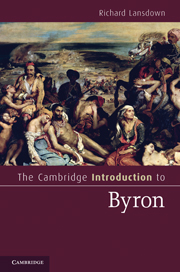Book contents
- Frontmatter
- Contents
- Figure and tables
- Preface
- Abbreviations
- Map: Lord Byron’s Europe
- Chapter 1 Life
- Chapter 2 Context
- Chapter 3 The letters and journals
- Chapter 4 The poet as pilgrim
- Chapter 5 The orient and the outcast
- Chapter 6 Four philosophical tales
- Chapter 7 Histories and mysteries
- Chapter 8 Don Juan
- Chapter 9 Afterword
- Notes
- Further reading
- Index
Chapter 1 - Life
Published online by Cambridge University Press: 05 February 2013
- Frontmatter
- Contents
- Figure and tables
- Preface
- Abbreviations
- Map: Lord Byron’s Europe
- Chapter 1 Life
- Chapter 2 Context
- Chapter 3 The letters and journals
- Chapter 4 The poet as pilgrim
- Chapter 5 The orient and the outcast
- Chapter 6 Four philosophical tales
- Chapter 7 Histories and mysteries
- Chapter 8 Don Juan
- Chapter 9 Afterword
- Notes
- Further reading
- Index
Summary
Childhood, boyhood, youth (1788–1809)
On 9 June 1779, a penniless army captain and remote member of an ancient English aristocratic family married his lover, the recently divorced and independently wealthy Amelia, Marchioness of Carmarthen, at Bath, the marital meat market of Georgian England. Their only surviving child, Augusta, was born in January 1783. Amelia died a year later, at which point Captain Byron lost the use of her income. (Augusta was brought up by relations until her own marriage in 1807.) In May 1785, ‘Mad Jack’ Byron was married again, once more at Bath, to Catherine Gordon, inheritor of a Scottish estate worth £30,000. Within three years he had almost expended his second wife’s inheritance, and she was pregnant in London with their only child.
The boy born on 22 January 1788 would become one of the most famous men in Europe, Britain’s first authentic literary celebrity, one of its most eminent poets and enduring personalities, the author of the greatest long poem in English since Paradise Lost (1667) and the greatest comic poem in any language, and an example to freedom fighters worldwide for decades after his death in 1824. Yet he was born with a club foot in a rented room off Oxford Street, while his father kept away from London to avoid his creditors. Captain Byron soon escaped to France, and would die there in 1791 in the arms of his sister – with whom he had had a sexual affair. His wife had managed to secure a portion of her estate that gave her an income of £150 a year, and in the summer of 1789 she went home with her child to live in Aberdeen. Her son scarcely saw his father again.
- Type
- Chapter
- Information
- The Cambridge Introduction to Byron , pp. 1 - 16Publisher: Cambridge University PressPrint publication year: 2012

